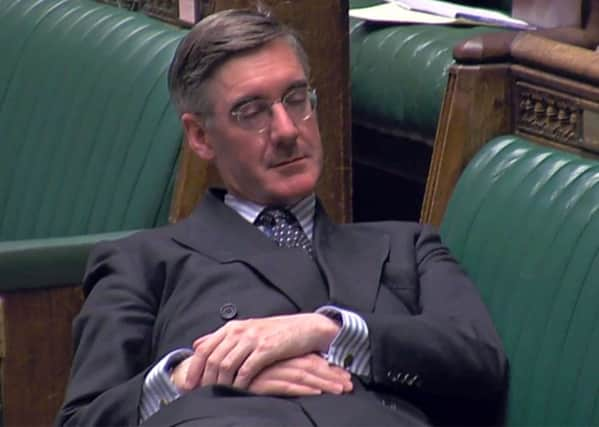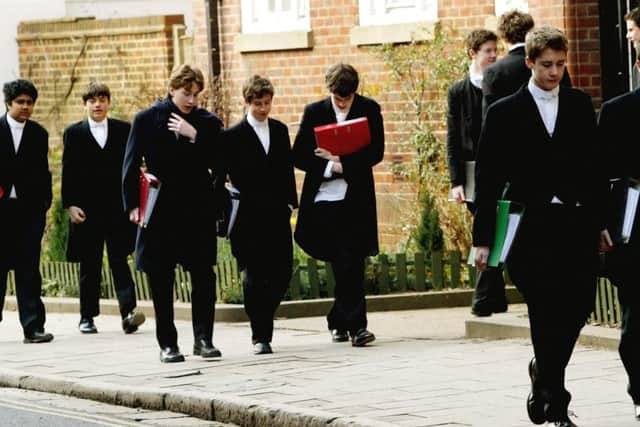An unexpected reason why Labour’s pledge to abolish private schools is good news – Cameron Wyllie


Brexit seems to have been around forever. No matter your view on the issue, it has stood like a colossus in the newpapers, particularly recently, and everything else has had to wait its turn in the shadows of page six or nine.
One thing that has happened, which picked up a bit of traction when it was announced, but has lain dormant since, is the Labour Party’s decision to put the abolition of private education into its next manifesto, for an election that must be imminent. The abolition! End it! Make it illegal! Burn the tailcoats and those funny blazers they wear at Fettes! Good grief.
Advertisement
Hide AdAdvertisement
Hide AdObviously, interested parties on both sides have had a bit of a say, pitting ‘posh heads’ against old lefties, who have been waiting for this for generations. Otherwise, though, there’s been a lack of general discussion – people talk to me about Brexit, Boris, indyref2, Trump, the best candidate to beat Trump (I thought about a run myself), Big Little Lies, The Booker Prize, doughnuts etc but actually no-one asks what I think about the abolition of private education, and I was the principal of a private school. Odd. So, just in case anyone’s actually interested, here’s what I think.


I’m actually quite pleased. For all the time I taught in the hallowed halls of the Edinburgh independents, the Labour Party and the SNP have periodically sniped away about private schools. Charitable status, business rates relief, the possibility of VAT on school fees – little incremental steps that have been considered, argued over, chucked out and then reintroduced.
Of course, all of these financial attacks, if and when implemented, only have one effect – school fees go up and what does that do? It inevitably (and this is just logically obvious) means that the gap between those who can afford private education and those who can’t grows, and the schools’ capacity to offer bursaries to less well-off families diminishes, so the great irony is thus that the schools will have yet more ‘privileged’ children, of the ‘elite’, young people who feel ‘entitled’, when it’s these supposed ‘privileged’, ‘elite’ and ‘entitled’ children that the opponents of private education hate so much.
When Mr Rees-Mogg reclined on that bench in the Commons, why didn’t somebody just tip him off it? Instead that image curdled in the minds of all those who hate ‘public schools’ and fed their flames.
Gloves are off
Advertisement
Hide AdAdvertisement
Hide AdSo, if abolition is a political broadsword, at least it’s what the fight is actually about. It’s about the sincere view held by many people that public/private/independent schools create an unfair society, which is ruled by an educational minority who dominate politics (well, certainly English politics), the law, ‘good’ universities, the Church, the Arts etc. So at least the gloves are off and a proper debate can ensure, rather than all this faffing about around the edges.
It’s a debate which will be very repetitive, will lack evidence and contain lots of bile that’s been waiting to be spilt for a long time. And you know, sitting here in Edinburgh, where the proportion of children educated privately must be the highest in Britain (Europe? The world – nobody’s ever given me a reason to contradict that, for countries which have a proper state education system), you can see why private schools could make people angry.
However – you might have been waiting for the ‘however’ – it would, of course, be a disaster to abolish private education just to pacify the old socialists and I hope, in the unlikely event (well, polls must mean something) of a Labour majority government, they will take stock – and that goes for the SNP too, if they find themselves supporting Mr Corbyn in government.
Let’s leave aside for a minute the economic argument, because let’s just assume that finding the extra hundreds of millions to educate private school kids in the state sector is deemed a price worth paying – remember, people who pay school fees are also taxpayers who have already ‘paid’ for their children to be educated in the state sector. And let’s leave aside the argument about ‘charity’, because no matter how well-evidenced the charitable work of lots of private schools is, it all falls away to nothing in a public mind that says – ‘private schools – Eton – Boris’ in a way that makes no more sense than saying ‘foodstuffs – cheese – Danish Blue’. There are private schools and private schools, all with their individual stamp, and many doing highly specialised work, but that wouldn’t necessarily save them in the tsunami of ‘equality’.
A question of choice
Advertisement
Hide AdAdvertisement
Hide AdNo, the real argument, the only true argument is about choice, and people’s right to have a choice about how their children are educated. “Yes,” I hear a voice like a discordant Minnie Mouse in my ear, “but not everybody has that choice.” That, of course, is true, but my answer is that every parent and every child should have real choices, and maybe if they did have these choices, within a diverse and creative state sector, then we could talk about whether a ‘private’ school is actually still necessary.
Because, let’s remember, private education is not like private health. My impression is that private health care is the same as that which is provided by the NHS, except you get it on demand rather than waiting and you’ll have a private room and an a la carte menu. Essentially though, the knee replacement will be the same op, very possibly carried out by the same surgeon.
Private education, in its rich and varied forms, offers something intrinsically different to state education – since the introduction of ‘Curriculum for Excellence’, it offers a different curriculum, with a different emphasis on the co-curriculum, sport, the arts etc. The pastoral regime in private schools is different, the discipline. I could go on and on, but the central point is that private schools in Scotland are more different to state schools now than they have been in my lifetime.
They are, in truth, ‘independent’ schools, as they prefer to be called. So Mr Corbyn – who so reminds me of the hard left of my university days – will, I sincerely hope, fail to abolish private education, and will fail until state education provides the real choices that will serve the needs of all our young people.
Cameron Wyllie, a retired headteacher, publishes a blog called A House in Joppa